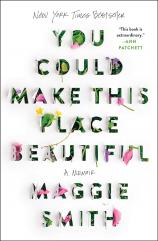You Could Make This Place Beautiful: A Memoir
Review
You Could Make This Place Beautiful: A Memoir
In the fall of 2015, Maggie Smith sat in a coffee shop in central Ohio and wrote the poem “Good Bones” on a legal pad. Only 17 lines, it shows the cesspool that the world may in fact be, but it ends with two sentences: “This place could be beautiful, right? You could make this place beautiful.” It was published the following year in Waxwing, an online journal, and it went viral shortly after that. “Good Bones” truly took on a life of its own. It has been celebrated and read again and again on television programs, during award ceremonies and in anthologies. The poem, its publication and Smith’s subsequent rise in the literary world are important to know when you begin this memoir.
"Maggie Smith’s search for herself using a heartbreaking portion of her life as the impetus is captivating, intelligent reading.... [A]s a writer-mother-friend, she offers honest insight into her world when it was upended."
Maggie Smith now says that her marriage was never the same.
The epigraph for YOU COULD MAKE THIS PLACE BEAUTIFUL is from Emily Dickinson: “I am out with lanterns, looking for myself.” The book is focused on Smith’s now-concluded contentious divorce, and she returns again and again to the search for self --- a single self to be found after she enters into the blackness and trauma when she discovers her husband’s infidelity and endures the separation and divorce that follow.
Smith explains this will not be a “tell-all” narrative, for who can “tell all” when only one side is telling? She is scrupulous about keeping private her ex-husband’s name and location, and she refers to him frequently as the Sender. She begins by snooping --- yes, she is ashamed then and now of the snooping --- in his briefcase one evening. She discovers a postcard addressed to a woman in another state; he becomes the Sender of postcards. She then opens and reads his journal and realizes the cast of characters he is writing about are not notes for a novel or a play. They’re real people, and this is now her life. She absorbs this reality, returning again and again to the moment when she realized that her life had changed.
Several pages are set aside for responses to questions Some People Ask. Some are prompts from her therapist, it would seem, while others are from well-meaning friends and family. One question is why such-and-such an event or a person isn’t included in the writing. And it’s a good question. There are few details about her extended family living in Ohio or the writers and other friends she sees throughout the years of creating this book. Smith explains that a memoir is “the art of memory,” and part of the art is the curation. Hers isn’t a story of a woman who falls in love again and lives happily ever after. Hers is the story of a woman coming home to herself.
Smith uses another series of pages with the heading: A friend says every book begins with an unanswerable question. The questions are as brief as her staccato answers. At the beginning of the book, one question asks: Then what is mine? Her reply: How to forgive. Smith returns to the question of forgiveness at the conclusion of the memoir, and it seems she has made a genuine effort both to answer the question and to forgive. Her readers and followers will understand both the simplicity and complexity of this exchange, and in fact we may create and pose to ourselves our own series of unanswerable questions.
Maggie Smith’s search for herself using a heartbreaking portion of her life as the impetus is captivating, intelligent reading. She wishes at the end of YOU COULD MAKE THIS PLACE BEAUTIFUL that she had included more jokes and humor, but it’s understandable that there is little here. Instead, as a writer-mother-friend, she offers honest insight into her world when it was upended. It feels as if she is still straightening out the corners, tucking in the bottom sheets, asking hard questions, and understanding that every ending is a secret until it happens.
Reviewed by Jane T. Krebs on April 28, 2023
You Could Make This Place Beautiful: A Memoir
- Publication Date: June 4, 2024
- Genres: Memoir, Nonfiction
- Paperback: 336 pages
- Publisher: Atria/One Signal Publishers
- ISBN-10: 1982185864
- ISBN-13: 9781982185862




